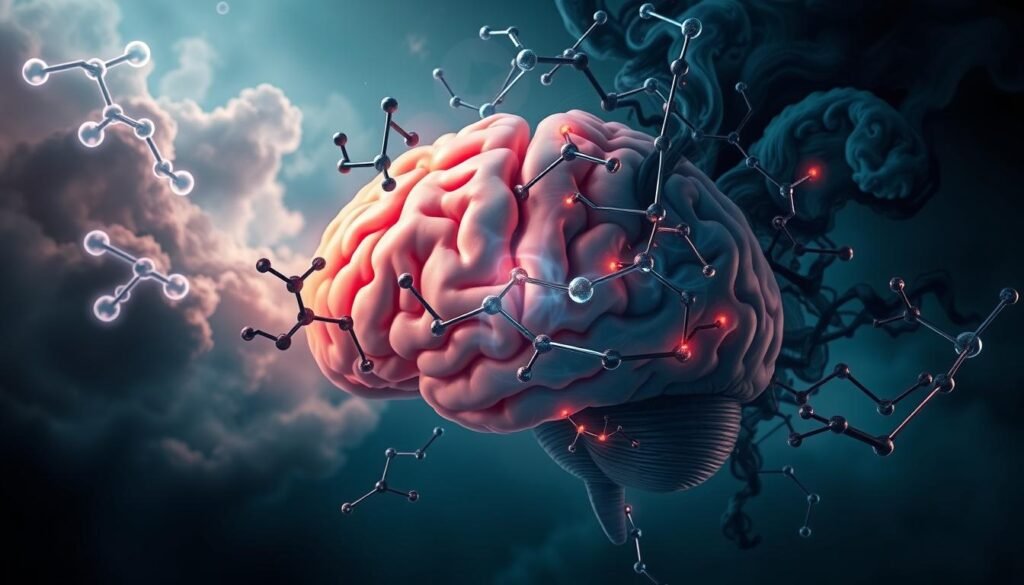Ozempic is getting popular for managing weight and Type 2 diabetes. But, there’s a growing concern. Could this medication affect your mental health? There are reports of Ozempic depression side effects. These include feelings of anxiety and even thoughts of suicide. Now, healthcare professionals are debating if the link between semaglutide and depression is a real risk or just a minor worry.
Some research shows that GLP-1 drugs like Ozempic might actually help some people feel better mentally. But, it’s still hard to say for sure. The European Medicines Agency is looking into these potential mental health issues. They want to make sure people thinking about using Ozempic are aware and careful. We’ll dive deep into what using Ozempic means for your mental health and medication safety in this article.
Learning all about Ozempic helps you make smart choices for your health. It’s important to weigh the benefits of losing weight against the chance of feeling emotionally unwell.
Key Takeaways
- Ozempic, primarily used for Type 2 diabetes, has gained attention for its weight-loss effects.
- There are conflicting reports on semaglutide and depression, necessitating careful consideration.
- Public health bodies are actively investigating potential mental health risks related to Ozempic.
- Some studies suggest a lower incidence of depression in GLP-1 users compared to non-users.
- Close monitoring for signs of emotional disturbances is vital for Ozempic patients.
- The importance of consulting healthcare professionals regarding mental health when considering Ozempic.
Understanding Ozempic and Its Uses
Ozempic contains semaglutide and is used mainly for Type 2 diabetes. It belongs to GLP-1 receptor agonists. These drugs help control blood sugar by boosting insulin release and making you feel full quicker. Ozempic is also picked by some for its weight loss benefits.
There’s a lot of talk about using Ozempic for weight loss. But, it’s important to know about its safety, especially regarding mental health. Studies on semaglutide show it helps with weight loss. Yet, we must watch out for downside effects. Wegovy, a similar drug for losing weight, warns users about mental health issues like feeling anxious or sad. Ozempic doesn’t have this warning, but the risk is still there for its users.
Research points out that Wegovy might have more mental health effects than Ozempic. This could be because of the different amounts of semaglutide in them. Side effects common to both, like feeling sick or having diarrhea, could also hurt your mood. Not drinking enough water because of these issues can make mental health problems worse.
If Ozempic makes you feel mentally unwell, talk to your doctor. They might adjust your dose or suggest another treatment. This way, you can take care of your mental health while working on weight loss goals. Knowing how these treatments affect you is key to getting better safely.
What is Semaglutide?
Semaglutide is the key ingredient in Ozempic, a major drug for Type 2 diabetes. It boosts insulin release, improving blood sugar levels. The FDA approved it in 2017. Now, about 5 million Americans use it in 2023. Not just for diabetes, nearly 40% take it for weight loss, cutting about 10%-15% of their weight.
Semaglutide is also in Wegovy, another weight loss medication. Both need close watch for side effects, but they work well. In tests with over 3,500 people, less than 1% had serious mood changes. And fewer on semaglutide felt depressed compared to a placebo group.
Knowing about semaglutide matters for managing diabetes and knowing its mood side effects. It’s key for patients to stay informed while using this medicine.
Ozempic Depression Side Effects: Is There a Link?
Ozempic and mental health issues are now a big concern for doctors and patients. People have reported feelings of anxiety, depression, and even thoughts of suicide while using Ozempic. These ozempic mental health risks are making headlines and causing investigations.
Reported Cases of Mental Health Issues
The FDA’s reporting system shows 489 cases of patients feeling anxious or depressed after taking Ozempic. These depression reports are helpful, but they need confirmation. Even so, they point to a worrying link between the drug and mental health problems.
FDA and EMA Investigations
The European Medicines Agency is looking into reports of self-harm or suicidal thoughts linked to Ozempic. These FDA investigations show the urgent need for more studies. We need to know if Ozempic really causes these serious side effects.
Doctors should look at a patient’s mental health history before prescribing Ozempic. This helps understand the risks better. As we learn more about ozempic mental health risks, ongoing research is key. For more information, check out this study here.
The Role of GLP-1 Agonists in Mental Health
GLP-1 agonists, like semaglutide, are known for their role in diabetes and weight loss management. They are linked to mental health in recent studies. It’s vital to understand how these drugs work to grasp their potential psychiatric side effects.
How GLP-1 Agonists Work
These drugs boost insulin secretion and slow down food digestion, reducing hunger. This helps keep blood sugar levels steady. Research shows they might affect the brain, which could alter mental health. Studies found users have a 98% higher chance of psychiatric disorders compared to non-users, with some groups facing more risk.
Psychiatric Side Effects of GLP-1 Agonists
The study of GLP-1 agonists shows worrying psychiatric side effects. Users of semaglutide, for instance, are at a 195% greater risk for depression and 108% more for anxiety. Psychiatric issues tend to appear between 6 months and 5 years of use. The risk for major depression in users is nearly three times higher, with young adults and women being more vulnerable.
| Condition | Percentage Increase in Risk |
|---|---|
| Any Psychiatric Disorder | 98% |
| Major Depression | 195% |
| Anxiety | 108% |
| Suicidal Behavior | 106% |
While negative psychological impacts are a concern, there are also reports of benefits. GLP-1 drugs may lessen depression and anxiety in over three million diabetes patients. The FDA has clarified there’s no proven link between these drugs and suicidal thoughts. This complex relationship between GLP-1 agonists and mental health highlights the importance of further research. Understanding these effects could improve how we manage patients’ health.

Patient Experiences with Ozempic
People have shared different feelings of emotional upset while using Ozempic. Patient reports often talk about anxiety, changes in mood, and feelings of sadness. These point to concerns about how it might affect mental health.
Anecdotal Accounts of Depression
Many have said they felt more anxious or sad after beginning Ozempic. Some felt alone, connecting these emotions to starting the medication. It’s key to consider these feelings when thinking about Ozempic’s wider effects.
Personal Narratives Highlighting Emotional Disturbances
Stories about Ozempic focus on ozempic and depressive symptoms felt by users. They share challenges faced and highlight the need to watch mental health during treatment. For more on dealing with major depression, check out SNRIs as a treatment option.
| Reported Issues | Percentage of Total Reports |
|---|---|
| Depression | 50% |
| Anxiety | Followed depression |
| Suicidal Ideation | 20% |
| Adverse Psychiatric Events | 1.2% |
| Fatal Outcomes | 20 cases |
Talking about possible emotional upsets with doctors before starting or continuing Ozempic is crucial. Recognizing and dealing with these problems helps manage both physical and mental health while on the medication.
Potential Mechanisms Behind Mental Health Effects
Ozempic and its link to mental health spark major curiosity. Using Ozempic for weight loss changes how a person feels mentally. It can make them feel better about themselves or bring on worry and shame. This is especially true with how society views body image.
The drug works by affecting how hungry you feel and how your body handles sugar. But it might also mess with brain chemicals that affect mood. People taking Ozempic have reported feeling down or even having thoughts of harming themselves. An FDA report has highlighted these mental health concerns, underlining the need for careful watch.
Gaining back weight after stopping the medication adds to the mental struggle. Research shows most people put back on much of the weight they lost. This can make them feel like they’ve failed, leading to sadness. Support for mental health is critical here. Specialists can really help those dealing with the mental side of weight loss.
There’s more to learn about how Ozempic impacts mental health. Understanding the connection between the drug and emotional issues needs more research. For more details, check out this informative article.

Monitoring Symptoms While Taking Ozempic
It’s important to watch for changes in your mental health when taking Ozempic for Type 2 diabetes. Know the signs of depression and anxiety. This lets you talk to your doctors about how you’re feeling. If you start feeling really sad or lose interest in things you usually like, tell someone. Regular doctor visits are key. They help your doctor keep an eye on your health.
Signs of Depression and Anxiety
Look out for these signs of depression if you’re taking Ozempic:
- Persistent feelings of sadness
- Loss of interest in activities once enjoyed
- Increased irritability or mood swings
- Changes in appetite or sleep patterns
If you notice any of these, get in touch with your healthcare provider right away. Recognizing these early can help you feel better faster.
Importance of Regular Check-ups
Check-ups are not just for diabetes. They’re also for keeping an eye on your mental health. At these appointments, doctors can:
- Evaluate how you’re feeling mentally
- Talk about any emotional issues during treatment
- Change your meds or try new ones if needed
Talking about mental health is crucial. This is especially true because of recent studies on Ozempic and mental health. For more info, read this article.
Concerns Over Weight Loss Drugs and Mood Changes
The talk about Ozempic raises questions about weight loss drugs and mood changes. The rise in using drugs like Ozempic worries many about mental health. This is because people who use them share their experiences online.
When looking at drugs like Wegovy and Saxenda, warnings about mental health are noted. It’s crucial to know how these drugs might affect your mood. This knowledge helps in making careful treatment choices.
Comparing Ozempic and Other Weight Loss Medications
Research shows that semaglutide drugs can change how you feel. The FDA has found cases of anxiety and depression in Ozempic users. Some even had suicidal thoughts. A study on liraglutide found similar mood risks.
Looking at GLP-1 receptor agonists, some studies show they might make anxiety worse at first. But this might improve over time. Still, responses to these drugs vary widely. Some people might eat less out of emotion. Others miss their old ways to cope. We need more studies on how these drugs affect mental health.